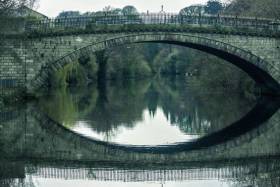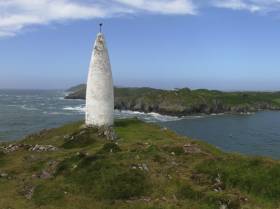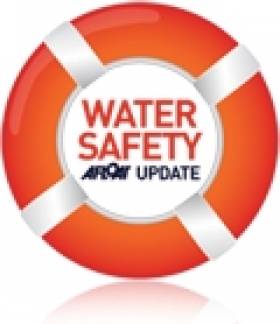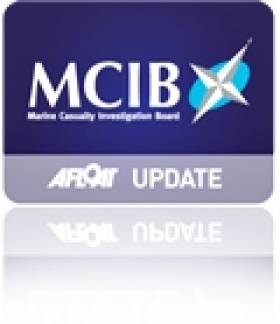Displaying items by tag: drowning
Teenager Drowns In Liffey Accident At Islandbridge
#Drowning - Newstalk FM reports that a teenage boy has died after drowning in the River Liffey near Dublin city centre yesterday afternoon (Saturday 14 May).
The body of the 13-year-old boy was recovered by the Garda Water Unit from the stretch of the Liffey between Islandbridge and Chapelizod.
Irish Water Safety has previously warned of the dangers of playing in, on or near the water, noting that 30 children aged 14 and under have drowned in the last decade.
Baltimore Drowning Deaths 'Accidental', Inquest Hears
#Baltimore - A verdict of accidental death was returned at Clonakilty courthouse today (Tuesday 26 April) in the deaths of a Penney's retail scion, his son and his son's girlfriend, all three of whom drowned off Baltimore in West Cork last summer.
According to RTÉ News, the inquest heard coroner Frank O'Connell describe Barry St John Ryan (51) as an "extremely brave and courageous man" for entering the water to attempt to rescue his son Barry Davis Ryan (20) and Niamh O'Connor (20) after they were swept into the sea from the rocks by an unexpected wave on 30 June last.
The bodies of Ryan Sr and O'Connor were recovered soon after, while Ryan Jr was found by divers 10 days later, as previously reported on Afloat.ie.
The court heard an emotional statement from Ryan Sr's daughter Charlotte, who was 12 years old at the time, and who recalled how an afternoon out fishing from the shore at a popular beauty spot suddenly turned to tragedy.
RTÉ News has more on the story HERE.
NI Newlyweds Drown Off South Africa
#Tragedy - A couple from Northern Ireland have drowned in South Africa just days after their wedding, as RTÉ News reports.
The bodies of 28-year-old John Rodgers and his 26-year-old wife Lynette from Holywood, Co Down were found on Friday evening (24 October) some 200 metres apart in shallow surf on a beach near Plettenberg Bay in South Africa's Western Cape province.
It's believed that they got into difficulty while swimming on what was the first day of their honeymoon. Strong rip currents are common in an area known for rough seas.
RTÉ News has more on the story HERE.
Two Dead, One Missing In Baltimore Drowning Tragedy
#Tragedy - A descendent of the Penney's retail empire has been hailed as a hero after attempting to save the lives of his son and his son's girlfriend in a tragedy off West Cork yesterday (Tuesday 30 June).
As the Irish Independent reports, 51-year-old Barry Ryan dived into the sea off a popular Baltimore beauty spot to try to rescue his son Barry Davis Ryan (21) and his son's girlfriend Niamh O'Connor (20).
Davis Ryan had himself entered the water to save his partner after she was apparently swept out to sea from the rocks near Baltimore village yesterday evening around 6pm.
With all three in difficulty, Ryan called for his daughter Charlotte (14) on shore to raise the alarm, and Baltimore RNLI was on scene within 10 minutes.
However, despite the best efforts of lifeboat crews from Baltimore and Union Hall and local search and rescue units, the bodies of Ryan and O'Connor were soon recovered and pronounced dead shortly after being airlifted to Cork University Hospital.
The search for Davis Ryan was expected to resume at first light this morning after poor conditions hindered efforts last night. The Irish Independent has more on the story HERE.
Number of UK Drownings at Lowest Since Records Began
#drowning – The number of accidental drownings in the UK has fallen to its lowest level since records began.
There were a total of 338 water-related deaths from accidents or natural causes across the UK in 2014, according to a report published today by the National Water Safety Forum (NWSF).
That number, from statistics published by NWSF, has fallen from 381 in 2013, and is the lowest figure since data collection began in 1983.
The NWSF's Water Incident Database (WAID) breaks down drownings and other water-related deaths by activity, age and location type.
The highest proportion of those people who have lost their lives in 2014 did not intend to be in the water - the main activity being undertaken before they died was walking or running alongside water (138 deaths, predominantly in rivers and coastal water), while 36 people drowned while swimming in unsupervised places, the next leading cause.
Last year's figures show that, like previous years, males (271) are more likely to drown than females (71), with a higher number of deaths for males than females in every single age bracket recorded.
Men aged between 25-29 are a particular concern, with 29 dying in 2014. Children aged up to 19 account for just over one in 10 of all deaths (38), with 21 of those in the 15-19 age bracket.
July saw the biggest spike in the number of deaths (43, up from 20 in June and 29 in August), while January was also a problem month, with 38 people killed.
George Rawlinson, chairman of the NWSF, said: "It's really positive that we're starting to see a decline in the numbers of accidental drownings but any loss of life is tragic and there's more that we can do to reduce these figures further. WAID provides vital insight that helps interested groups shape interventions to protect those people most at risk.
"The NWSF and their respective organisations work tirelessly to promote education and water safety and together are now developing a strategy that could be adopted nationally; this will provide an important framework for identifying how improvements in safety and education could be made to tackle this problem.
Lack Of Experience, Absence Of Radio & Stability Issues Compounded 'Zillah' Dinghy Tragedy - MCIB Report
#Zillah - Lack of seafaring experience and the absence of a VHF radio or other means of contact compounded a tragic situation that led to the death of a retired teacher after the capsize of his dinghy off West Cork last summer, according to the official investigation into the incident.
As previously reported on Afloat.ie, an inquest into the capsize of the Drascombe Lugger Zillah returned a verdict of accidental death in the case of 66-year-old Douglas Perrin, who drowned after his vessel overturned and sent him and two companions into the water off Castle Island near Schull on the evening of 13 August last.
The court heard that guests Marian Brown and Patrick Anwyl, neither experienced sailors, were taking turns at the helm under the supervision of Perrin, a sailing instructor for more some 30 years, when the boat overturned in gusty weather.
As the report by the Marine Casualty Investigation Board (MCIB) outlines, it was found that the boat - built before the Recreational Craft Directive requirement and of a type known to have stability issues in certain conditions – gybed suddenly on the approach to the Amelia Buoy at the Schull Harbour entrance, taking all three by surprise.
The vessel quickly turned turtle, with its centreplate retracting into the stowed position, and the guests managed to clamber onto the upturned hull with Perrin in the water beside them.
However, they did not have a VHF radio or EPIRB-type beacon on the vessel, and there were no other boats in the vicinity to witness the incident not spot the casualties and attempt rescue.
Despite the mild water temperature, none of the three were wearing more than light summer clothes with their PFDs, and Perrin spoke of feeling cold within 30 minutes.
After the three attempted to swim some 50 metres to nearby rocks on Castle Island, Perrin was separated from his guests, who later saw him drifting past the island making no effort to swim but with his head above the waves.
It was many hours later into the following day, after an alert by Perrin's wife who had been expecting the group's return, that Brown and Anwyl were located and rescued by emergency responders. The body of Perrin was found a short time later off Sherkin Island.
The MCIB found that the guests' lack of sailing experience "meant that they did not react correctly to the developing situation" when the boat suddenly gybed.
Moreover, the lack of a radio, which would have immediately alerted any number of vessels in the nearby Schull area as well as emergency teams, would have likely seen all three rescued in a matter of minutes.
It's also possible that had their PFDs been fitted with lights and whistles, the guests may have been spotted sooner by search and rescue crews.
The full report into the Zillah incident by the MCIB, including its safety recommendations, is available to download HERE.
Irishmen Who Drowned Off Crete Are Named
#Drowning - The Irish Times names the two Irishmen who died off the Greek island of Crete last week as John James Lynch and Kevin Eugene Devine.
Lynch (45) and Devine (46), who are thought to be from Co Louth, drowned off Mavros Molos on Kissamos Bay on Friday 29 August after entering the water to swim despite the beach being red flagged to bathers.
Surfers in the vicinity went the aid of the men when they were spotted in difficulties, but they were reportedly dead when brought back to the shore.
It's understood that the beach lifeguard had gone off duty a short time before the Irishmen entered the water.
The Irish Times has more on the story HERE.
Two Irish Drown While Holidaying On Greek Island
#Drowning - TheJournal.ie reports that two Irishmen died from drowning on the Greek island of Crete in an incident on Friday (29 August).
The two men are thought to be in their 40s and were holidaying on the Mediterranean island. Consular assistance is being provided to their families.
Tragedy As Nuns Drown At Kerry Beach
#Drowning - Tributes have been paid to two nuns who died after getting into difficulty at Inch Beach on the Dingle Peninsula yesterday (Thursday 14 August).
Sr Paula Buckley and Sr Imelda Carew, both from Dublin, were two of three Presentation sisters who were holidaying on the peninsula when tragedy struck yesterday evening.
It is as yet unclear what happened, according to The Irish Times, which says the women were close to the shore and standing in shallow water in calm conditions when they were last seen by their companion from the beach.
Dingle gardaí have confirmed they are investigating the women's "sudden deaths". The Irish Times has more on the story HERE.
Drowning Death In NI Pond Sparks Further NI Flag Controversy
#Drowning - The death of a 68-year-old man who drowned while apparently attempting to remove Irish tricolour flags from an island in a Co Armagh pond has sparked new political tensions in Northern Ireland.
According to RTÉ News, Oswald Bradley died after getting into difficulty while swimming in Bessbrook Pond, near Newry, yesterday evening (Monday 28 July).
UTV LIve quotes local SDLP politician Dominic Bradley who, while expressing his condolences, said: "It would appear that the man attempted to swim across Bessbrook Pond with the intention of removing two Tricolour flags that had been placed on an island there and replace them with a Union flag."
Meanwhile, fellow MLA Danny Kennedy of the UUP said the deceased was "highly respected and liked within the Bessbrook community. I counted him as a personal friend and I am deeply upset by his untimely and tragic death."
UTV Live has more on the story HERE.





































































